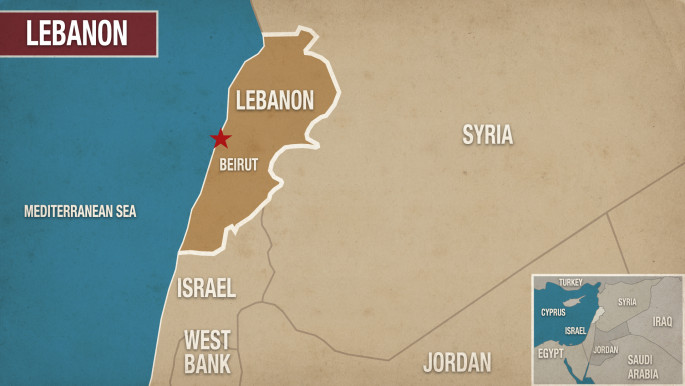Former ally slams Hariri's nomination of Aoun for presidency
In a message posted on Twitter late on Thursday Rifi accused Hariri of selling Lebanon to "the Iranian project" by supporting Aoun, who is politically aligned with Hizballah, the Lebanese Shia political movement funded by Tehran whose military wing is currently fighting in Syria in support of Syrian President Bashar al-Assad.
On Thursday, Hariri, a traditional ally of Saudi Arabia, announced that he was endorsing Aoun's presidential nomination in a move that could help end the ongoing political crisis that has compromised executive decision-making within the country - as long as it wins the requisite support.
Opposition to Aoun
Aoun heads the Free Patriotic Movement - the largest Christian party in Lebanon - which is part of the Hizballah-dominated March 8 political bloc. Even within March 8 Aoun's nomination is opposed by some, such as Nabih Berri, Lebanon's parliamentary speaker and head of the Shia Amal movement.
However, objections to his nomination are even stronger in the rival March 14 political bloc, headed by Hariri's Sunni Future Movement, with figures including former Prime Minister Fouad Seniora - also a member of the Future Movement - even expressing outright opposition.
 |
|
| [Click to enlarge] |
Rifi, a pugnacious political figure accused of funding militias in his native Tripoli, stepped down as Justice Minister in February and later split from the Future Movement in July.
He said the decision to resign as Justice Minister was motivated by a judicial ruling that saw controversial former MP Michel Samaha released from jail. Samaha, a close ally of Syrian President Bashar al-Assad, was imprisoned in 2012 after being caught trafficking explosives into Lebanon from Syria, allegedly for use in terror attacks in the country.
At the time, Rifi said the decision to release Samaha illustrated Hizballah's domination of state institutions within Lebanon - and later, upon leaving, the Future Movement in July stated: "I am not in the Future movement, but I am a fierce fighter in defence of political Harirism."
Like father, not like son
Hariri's father, Rafik, a former Lebanese prime minister, was assassinated in a massive bomb attack on a motorcade close to Beirut's seaside Corniche in February 2005. The Syrian regime of Bashar al-Assad, is widely suspected of being behind the attack, working through Hizballah.
Global condemnation in the aftermath of the killing forced Syria to end its 30-year occupation of Lebanon, and led to the formation of the pro-Syrian March 8 and anti-Syrian March 14 movements that have dominated Lebanese politics ever since.
Lebanon has been without a president since the resignation of former army general Michel Sleiman more than two years ago.
According to Lebanon's power-sharing constitutional system, the country's president must be a Maronite Christian, its prime minister a Sunni Muslim, and speaker of parliament a Shia Muslim.
— General Ashraf Rifi (@Ashraf_Rifi) October 20, 2016
" style="color:#fff;" class="twitter-post-link" target="_blank">Twitter Post
|
Translation: We will not accept the delivery of the country to the Iranian project.
An end to political stasis?
Aoun and Hariri must now canvas sufficient support to gather a quorum of two thirds of parliament members to attend a vote scheduled for October 31 to elect a president.
That sitting will mark the 46th time since Sleiman's resignation that MPs have met to nominate a successor.
In the past two years, a plethora of candidates have been presented as potential candidates before being discarded at the wayside. Analysts say that Hariri, who spends the majority of his time outside Lebanon between Riyadh and Paris due to fear of assassination, is bargaining that, by nominating Aoun, he will secure his own ascent to the prime ministership.
He previously served as prime minister from 2009 until 2011, when his government collapsed after Hizballah MPs resigned en masse due to Hariri's refusal to end cooperation with the Special Tribunal for Lebanon, a UN-backed investigation into his own father's death.
Aoun - a civil-war-era army general that once accepted weapons shipments from Saddam Hussein and spent a period of exile in France - has expressed hope that his rapprochement with Hariri will help "restore Lebanon's security and stability and revive it economically", while also restoring "political unity".
Hizballah has also released a statement welcoming the move.
Internal divisions within Lebanon's highly fractured sectarian political system have been exacerbated by Syria's civil war. Hizballah's military support of Bashar al-Assad has angered the March 14 movement, while hundreds of Lebanese Sunnis, particularly from Rifi's hometown of Tripoli, have travelled to Syria to join rebel groups.
The failure of Lebanon's parliament to elect a president for over two years has contributed to an atmosphere of political stasis and exacerbated pre-existing divides and economic woes in a country that currently hosts more than one million Syrian refugees, a quarter of its total population.


![Widespread famine is imminent in Gaza [Getty Images]](/sites/default/files/styles/image_330x185/public/2024-03/GettyImages-2015647000.jpg?h=199d8c1f&itok=mJWWP_Td)
